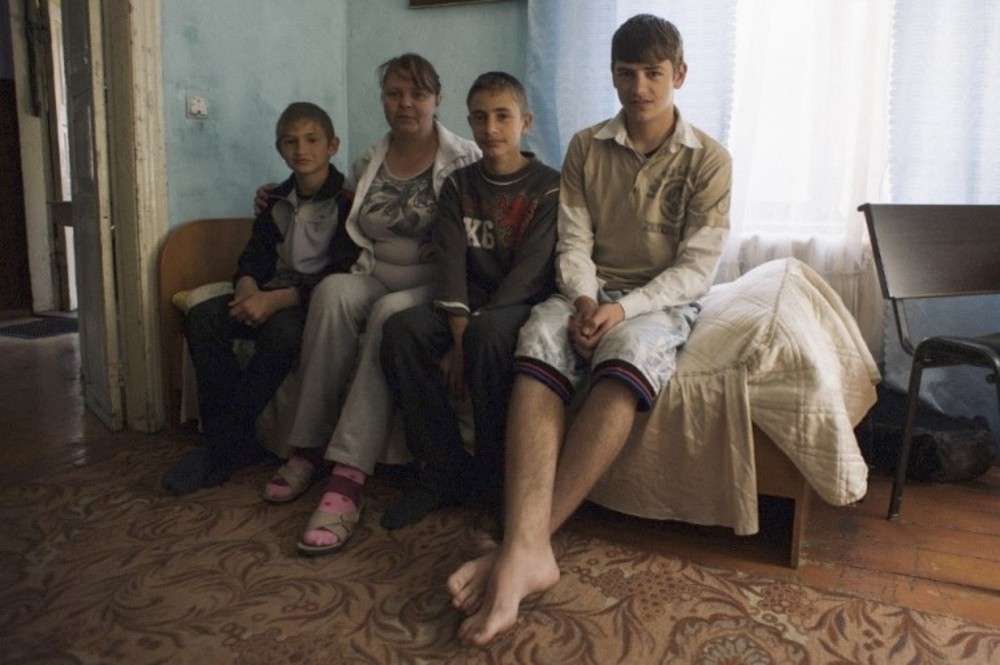Your donation helps the world’s neediest Jews
 Avraham, Isaac and Diana Tkacenko live in Kazakhstan with their older brother, parents and grandmother in an old, run-down house. /JDC
Avraham, Isaac and Diana Tkacenko live in Kazakhstan with their older brother, parents and grandmother in an old, run-down house. /JDC
Second in a series of three
The American Jewish Joint Distribution Committee (JDC) provides relief to the world’s poorest Jews. Those who are in dire need of assistance turn to the JDC for food, medicine, clothing, home care and heat. This assistance is heavily depended upon by economically vulnerable seniors and families living in places where few or no other social services exist. The JDC aims to help these seniors and families find their way to self-sufficiency and break the poverty cycle.
The Jewish Alliance’s Annual Campaign provides core funding for the JDC, whose relief programs around the world assist our extended network in areas that need it most.
Here is a look at relief programs in the former Soviet Union. After the downfall of that nation, thousands of elderly Jews fell into poverty. They lost their homes, their livelihoods and their social safety net. Many of these people were often forced to choose between food and medical care.
To date, there are over 130,000 elderly Jews across the former Soviet Union who rely on the JDC’s relief programs to survive. The JDC provides services such as home-care workers, supermarket food cards, food packages, meals on wheels, hot meals in communal dining rooms, free medical consultation, winter relief, rehabilitation equipment, day centers, and home repair.
Boris is 64 years old and lives in Vitebsk, Belarus, in a dorm-style apartment. In Boris’s case, he relied on many of these life-saving services all at once.
His father abandoned his family before he was born, and, as the only male, Boris felt responsible for supporting his family. He dropped out of high school to work, bringing whatever money he made to his mother. He also lived with his aunt and grandmother.
Before he hit retirement age, Boris’s mother became paralyzed. He left his distillery job to help care for her, resulting in only being able to collect a small pension – about $196 a month.
After his mother passed away, Boris could no longer afford the small home they had shared, so he moved into his current residence, which is now crammed with both their belongings, as well as trash that he does not have the energy to get rid of. The stress of his situation has taken a toll on his health. Boris developed hypertension, diabetes and blood clots in the leg. He spends most of his small pension on medications that keep him alive.
The JDC has been helping Boris: it has provided him with a bank card, which he can use for the remaining costs of his medications, as well as food. Without the JDC’s relief programs, Boris would have to choose between food and medicine.
During Jewish holidays, the JDC delivers holiday food sets to Boris, bringing him a little bit of joy and connection to Judaism.
The JDC’s relief programs do not stop at the elderly – they also help families afford the basic necessities to live a dignified life. Across the former Soviet Union, there are over 10,000 Jewish children living in poverty who need the JDC’s assistance. Many of these children are in difficult family circumstances, dilapidated housing or orphanages.
Avraham, Isaac and Diana Tkacenko live in Kazakhstan with their older brother, parents and grandmother in an old, run-down house. Their parents both work part-time jobs, neither of which brings in much money, so they cannot afford rent. Their home belongs to a family member, who lets them live there for free, but it is more of a storage basement than a home.
Their grandmother uses her small pension to buy food. Their local synagogue helps the Tkacenkos, but for a family of seven, it just is not enough. The children are malnourished because of a lack of food and vitamins.
The JDC’s relief programs have been saving the Tkacenko family. One of the JDC’s network of 145 Hesed social welfare centers – located across the vast expanse of the former Soviet Union – has been their main source of aid. They receive food packages and money for heating fuel and warm clothes. When the children fall ill, the JDC provides medical assistance and emergency assistance.
Without the JDC, Avraham, Isaac, Diana and their family might not survive.
You can help people like Boris and the Tkacenko family. Your gift to the Jewish Alliance’s Annual Campaign will help provide relief to thousands of impoverished Jewish elderly and families. They, just like so many around the world, need you.
Editor’s Note: There will be one more article, describing the JDC’s renewal programs throughout the world.
HILLARY SCHULMAN is a development associate in philanthropy for the Jewish Alliance of Greater Rhode Island.







